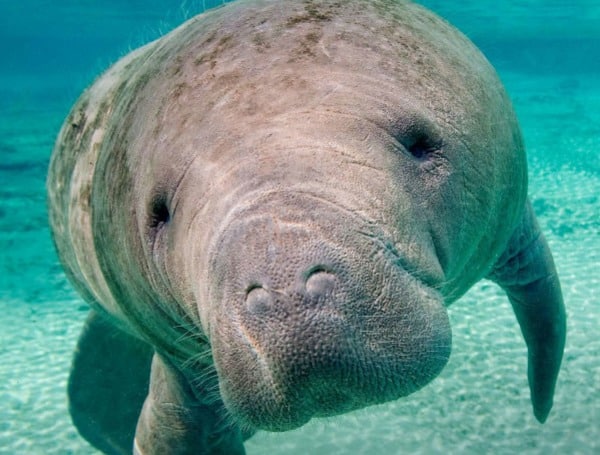Watching for manatees when boating in Florida is always important, but spring is an especially crucial time for boaters to slow down and check below for the slow-moving mammals as they gradually disperse from their winter habitats.
Manatees overwinter in Florida springs, power plant discharges, and other warm-water sites, relying on water that is warmer than 68 degrees Fahrenheit. As spring brings warmer temperatures, manatees gradually disperse from their winter habitats and are more likely to be in rivers, canals, and nearshore waters.
Although adult manatees are large, spotting them in the water can be challenging. Going slow and looking out below helps boaters and personal watercraft users better spot manatees that might be in the area.
Read: Governor DeSantis Highlights Florida’s Successful Efforts To Protect Florida’s Manatees
People on the water can help manatees by wearing polarized glasses, following all manatee protection zones, keeping an eye out for visible snouts or manatee “footprints” — large circles on the water that are indicators that manatees are below the surface, and always giving manatees space.
From April 1 through Nov. 15, seasonal manatee zones require boaters to slow down in certain areas to prevent manatees from being injured or killed by motorboats or personal watercrafts. Boat strikes continue to be a major threat to Florida manatees. FWC law enforcement officers patrol state waters to inform boaters of the seasonal manatee speed zones and take appropriate enforcement actions. Boaters are reminded to abide by the regulatory signs they see on the water. Manatee protection zones are marked by waterway signs and maps of manatee protection zones are available online at MyFWC.com/Manatee by clicking on “Data and Maps.”
Read: Florida Wildlife Preserves: Exploring Nature’s Treasures
As a reminder, manatees are a protected species, and it is illegal to feed, harass, or harm them. Physically handling a distressed or stranded manatee can cause additional harm to the manatee and could put you at risk of serious injury. Instead, report injured, distressed, orphaned, sick, or dead manatees to the FWC’s Wildlife Alert Hotline at 888-404-FWCC (3922) so trained responders can assist.
Resources for boaters, educators, and other interested members of the public are available at MyFWC.com/Manatee. What should you do if you see a manatee? The Viewing Guidelines page provides helpful tips on respectfully viewing manatees, additional guidelines for boat and personal watercraft operators, and information on what you can do to help these amazing aquatic mammals.
Are you interested in supporting the FWC’s manatee research, rescue, and management efforts? You can purchase a Florida manatee license plate or donate $5 to receive a collectible FWC manatee decal. Both are available from your local Tax Collector’s office.
Help support the Tampa Free Press by making any small donation by clicking here.
Android Users, Click To Download The Tampa Free Press App And Never Miss A Story. Follow Us On Facebook and Twitter. Sign up for our free newsletter.



